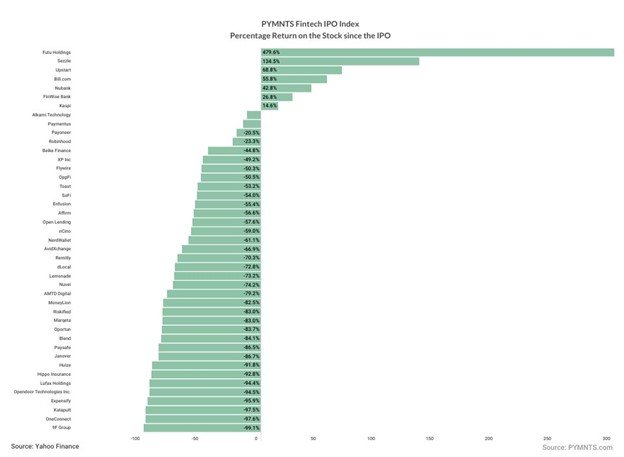For FinTechs in general, and the FinTech IPO Index in particular, this past week has been dominated by regulators, new rules related to data and disclosure, and legal wrangling in the courts.
Shares of Sezzle surged 19.8% through the past five sessions, while Affirm lost 4.3% through the same time frame. As PYMNTS reported, the suit filed this month by the Financial Technology Association seeking to stop a new rule from the Consumer Financial Protection Bureau (CFPB) governing buy now, pay later (BNPL) loans has raised issues tied to the “fit” of those rules.
The FTA, a trade group that includes Klarna among its members is suing the CFPB in the U.S. District Court in Washington, D.C., and asserts that the new rule must be set aside, because the agency has not fulfilled the usual notice and commentary periods.
The lawsuit argues that new obligations — extending the same disclosure practices of credit cards because BNPL providers will now be classified as credit card providers — are “ill-fitted” for BNPL products.
Also for FinTechs: The CFPB released its final rule on open banking — commonly referred to as Rule 1033 — which has now been expanded to include payment apps and data brokers. The rule establishes what we reported amounted to “strict guidelines for third parties seeking to access consumer data.” These entities must obtain explicit consumer consent, limit their data collection and use to what is necessary for providing requested services, and implement data security measures.
Scant Earnings, Plenty of Product Announcements
Lufax shares slipped 6.2% in the only earnings report a FinTech IPO member posted this week.
The company posted quarterly results this week: The total outstanding balance of loans was 213.1 billion yuan as of the September quarter, down 41.8% year over year.
The total number of new loans enabled was 50.5 billion yuan in the third quarter, which remained “flattish,” as the company said. The cumulative number of borrowers increased by 24.1% to about 24.8 million at the end of the latest quarter.
Upstart said this week that it has launched its T-Prime lending program. This new initiative in the Upstart Referral Network enables banks and credit unions to reach America’s more affluent “super prime” borrowers. Fourteen lenders have signed up for T-Prime, per the company release on Thursday (Oct. 24).
T-Prime focuses on almost half of Americans with credit scores above 720, a demographic that money center banks and FinTechs commonly serve. By leveraging Upstart’s platform, lenders can, as Upstart said, pair competitive rates with instant and automated approvals.
Upstart shares slipped 1.8%.
PYMNTS detailed that Marqeta has added two new products to its card program management tools.
The new UX Toolkit helps customers create modern payment experiences from scratch, while the new Portfolio Migration service makes it easier for companies to upgrade their existing card programs onto the Marqeta platform, the company said.
Upon using the UX Toolkit, Marqeta customers can develop front-end experiences more quickly while complying with current regulatory requirements, and the Portfolio Migrations service makes it easier to transfer card programs from any processor while ensuring a seamless experience for cardholders, Marqeta said.
Marqeta shares gathered 2.1% through the week.
Janover announced the rebranding of its real estate syndication software, Groundbreaker, to Janover Connect, as shares were up about 0.5%. The company also announced enhancements to its website, detailing how, as the firm said, “Janover Connect enables syndicators to efficiently manage one or multiple real estate investments and handle all aspects of limited partner relations.”



